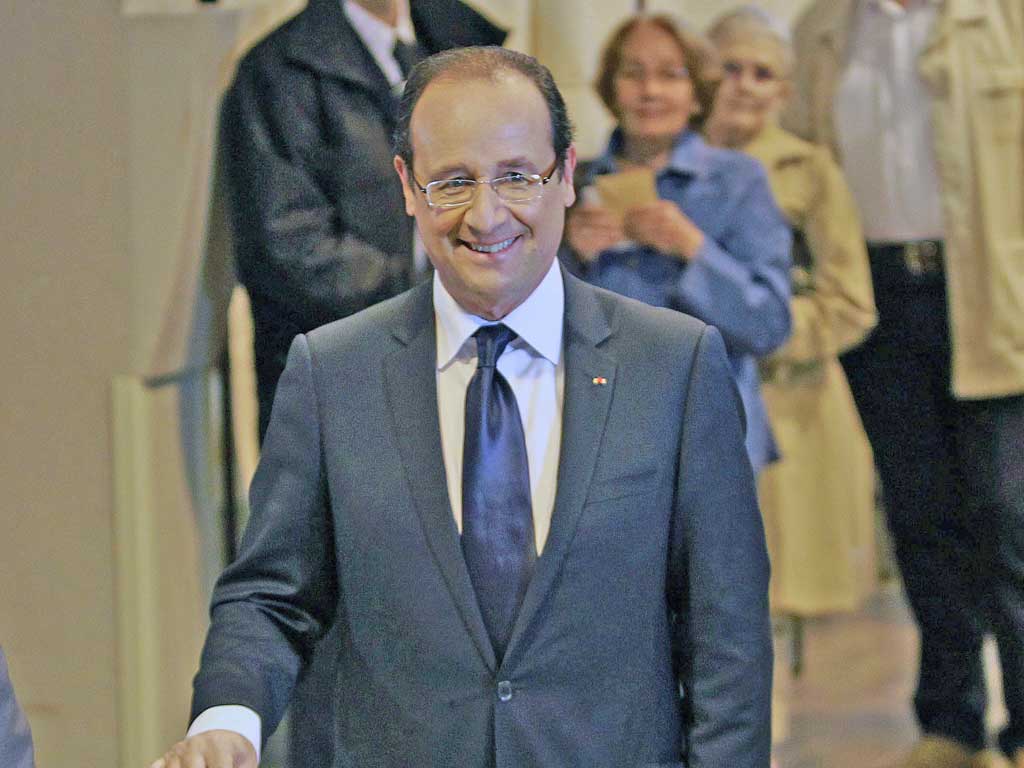Left poised for victory that would clear François Hollande to pursue growth

The moderate left was on course for a comfortable victory in French parliamentary elections last night, strengthening President François Hollande's grip on power.
First-round results suggested that Mr Hollande would win a substantial centre-left majority next weekend – and that his Socialist Party might seize control of the national assembly on its own. At the very least, he and his Prime Minister, Jean-Marc Ayrault, seemed assured of a majority of centre-left and Green deputies without needing the uncertain support of the Communists and hard left.
Projections based on the first-round results suggested that the Socialists might emerge with between 285 and 320 of the 577 seats in the national assembly. The Greens were predicted to win between 14 and 20 seats. At least 289 seats are needed for a majority.
The outgoing ruling party, the centre-right, Union pour un Mouvement Populaire (UMP) and its allies were predicted to fall to between 230 and 260 seats. The far-right leader Marine Le Pen easily topped the poll with 42 per cent of the vote in the ex-mining town of Hénin-Beaumont in the Pas de Calais.
Her party did less well than expected nationally, with 13 per cent of the nationwide vote, but still hope to win up to three seats in the second round next Sunday.
The anti-austerity, Eurosceptic, hard-left populist, Jean-Luc Mélenchon, who chose to challenge Ms Le Pen head-on in the Pas de Calais, came a cropper. He finished third behind a local Socialist, Philippe Kemel, and withdrew from the race last night to allow left-wing voters to combine against Ms Le Pen next weekend. Mr Ayrault said the first-round result was a victory for Mr Hollande's programme of "reform with fairness".
President Hollande had appealed to the French people to give him a "clear and coherent" parliamentary majority – by which he meant a majority of the "wider centre-left" embracing Socialists, radicals and Greens. He wanted desperately to avoid having to rely on parliamentary support from Communists and other hard-left deputies, running under the "Front de Gauche" (Left Front) banner of Mr Mélenchon.
Mr Hollande has promised policies to promote growth but he has also pledged to rule with fiscal discipline, including ill-defined cuts in the French state apparatus to reduce the budget deficit to zero by 2017. Mr Mélenchon and his supporters oppose almost all cuts in state spending and any cuts in the French welfare state.
The turnout yesterday, around 57 per cent, was a new low – a disappointment after the 80 per cent achieved in the presidential elections in April and May. The lack of enthusiasm for the third voting day in seven weeks was perhaps understandable.
And yet much was at stake. Although the French President is constitutionally the country's dominant political figure, his direct powers are limited. It is the majority in the lower house of parliament which decides whether he can rule with his friends and allies or whether he must appoint an opponent as Prime Minister. Although there have been three cases of "cohabitation" between the left and right in the last 26 years, the French have never denied a friendly majority to a new President.
The rules of the parliamentary elections are complex and sometimes perverse. Unlike the presidential elections, more than two candidates can reach the second round. Any candidate who tops 12.5 per cent of the registered vote in a constituency (not the actual votes cast) can go through to the run-off.
Most of the 577 constituencies will be one-on-one, right-left confrontations next week where the result is predictable. The high local scores for the National Front means that there will be some three-way battles – 30 to 40 – but fewer than expected. The low turnout meant that it was difficult for NF candidates to reach the true "qualifying" target of around 21 per cent of the "actual" vote.
The second round is decided on the first-past-the-post system like a British election. The left-wing parties have an understanding that, if two leftists qualify, only the best-placed candidate stays in the race.
Subscribe to Independent Premium to bookmark this article
Want to bookmark your favourite articles and stories to read or reference later? Start your Independent Premium subscription today.

Join our commenting forum
Join thought-provoking conversations, follow other Independent readers and see their replies